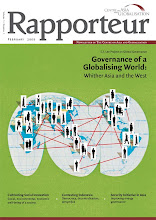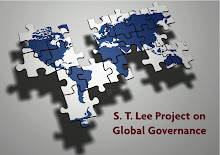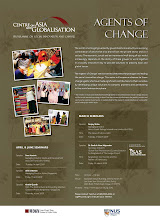 What does the Asian silence on the financial crisis really mean? Does it mean silent gloating, with a heavy dose of schadenfreude? Does it signify terror that Asian economies will also be blown away? Or does it reflect a sober calculation that calm and steady heads are required in such a storm? Amazingly, in the thousands of words spun in the incestuous western discourse on this crisis, little attention has been paid to Asian views, even though the calm and steady responses of China, India and Japan, the three anchor Asian economies, provide hope that there may be some pillars of stability in the swirling storm.
What does the Asian silence on the financial crisis really mean? Does it mean silent gloating, with a heavy dose of schadenfreude? Does it signify terror that Asian economies will also be blown away? Or does it reflect a sober calculation that calm and steady heads are required in such a storm? Amazingly, in the thousands of words spun in the incestuous western discourse on this crisis, little attention has been paid to Asian views, even though the calm and steady responses of China, India and Japan, the three anchor Asian economies, provide hope that there may be some pillars of stability in the swirling storm.There is little gloating in Asia, even though some would be justified. In many ways, US and European policymakers are doing the opposite of what they advised Asian policymakers to do in 1997-98: do not rescue failing banks, raise interest rates, balance your budget. Millions of Indonesians and Thais would have been better off if their governments had been permitted to do what western governments are doing now. An apology from the west to Asia would not be inappropriate.
Nor are the Asians terrified. They learnt many valuable lessons from their financial crisis in 1998: do not liberalise the financial sector too quickly, borrow in moderation, save in earnest, take care of the real economy, invest in productivity, focus on education. Hence, while America was busy creating a financial house of cards, Asians focused on their real economies. This explains why the latest International Monetary Fund growth rate estimates for 2008 and 2009 for China are 9.7 and 9.3 per cent; and for India, 7.9 and 6.9 per cent respectively.
Equally importantly, Asian minds have never been captured by the strange ideological belief that markets know best and government should step aside. Most Asian policymakers are puzzled by former US president Ronald Reagan’s statement: “Government is not a solution to our problem, government is the problem.” Alan Greenspan, former US Federal Reserve chairman, only recently admitted the folly of his ways when he acknowledged that lending institutions could not regulate themselves. By contrast, virtually all Asian governments believe that the virtues of the “invisible hand” in the market have to be balanced by the “visible hand” of good governance. This Asian emphasis on good governance may serve as a real asset in the storm.
In the past, Asian governments expected western counterparts to be role models of good governance. One story illustrates how times have changed. This year, a European banker consulted the Reserve Bank of India to learn how to get a banking licence in India. He was briefed on the conditions and told that the Indian authorities would also assess his regulator. The European banker smiled and said: “No problem. We have excellent regulation.” The Indian officer replied: “After subprime, we are not sure of US regulation; after Northern Rock, British regulation; after Société Générale, French regulation and after UBS, Swiss regulation.” In short, the gold standard that the west assumed it had in the field of regulation has vanished. Asians realise that they must forge their own standard. Fortunately, there will be no rush to overregulate. Tony Tan from the Government of Singapore Investment Corporation said: “We should guard against overregulation and protectionism and a retreat from globalisation.” His comments reflect an Asian concern: that the Americans and Europeans, hitherto the custodians of the liberal international economic order, will retreat into protectionism. Asian societies also know they are becoming the biggest beneficiaries of globalisation and must assume greater responsibility in stabilising the economic system.
As the world’s greatest emerging economic power, China has acted remarkably responsibly in this crisis. It has received with polite dignity the western bankers coming cap in hand to seek money. It did not remind them that barely a year ago many of the same bankers had castigated it for its conservatism in opening its financial sector. That caution has been vindicated. More importantly, China has continued to buy US Treasury bills at a steady pace to reassure the market it has not lost faith in them.
The Asian governments demonstrated their calm at the Asia-Europe meeting in Beijing last weekend. The premiers of China and India, Wen Jiabao and Manmohan Singh, gave thoughtful speeches. Sadly, the western media barely reported them. Mr Wen emphasised the development of the real economy; Mr Singh said: “In this age of globalisation we have a global economy but it is not supported by a global polity to provide effective governance.” Asian leaders have good advice to offer. The west should pay heed.
While the US and European publics are losing faith in free trade, Asian economies continue to work on free trade agreements. Few westerners are aware China and the Association of South East Asian Nations have concluded an agreement that will create the world’s largest FTA, with 1.7bn people. Japan and India have similar FTAs with Asean. This growing interdependence will act as a pillar of stability and growth for the global economy.
The really good news is that few Asians have lost their optimism about the future. They have no illusions about the crisis but are confident that they remain on the right trajectory to deliver the Asian century. This is why the key Asian economies will react calmly in this storm. Confidence in the future is a great asset in such times.
This article was first published in FINANCIAL TIMES.
Kishore Mahbubani is dean of the Lee Kuan Yew School of Public Policy at the National University of Singapore. His new book is titled: The New Asian Hemisphere: The Irresistible Shift of Global Power to the East.










No comments:
Post a Comment